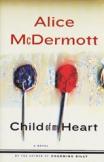A World Away
Alice McDermott’s fiction (like William Kennedy’s) is to be praised, if for no other reason than that it transcends the tradition of Irish-American fiction established by James T. Farrell back in the 1930’s. Since Studs Lonigan first swaggered onto the literary stage, Irish-American authors (broadly speaking, of course) have relied heavily upon stark realism to depict—that is, to romanticize or condemn—Catholic urban enclaves. In such novels as her 1998 National Book Award winner Charming Billy, McDermott uses this sociology merely as a foundation. Her families, after all, have left the old neighborhoods, even if sometimes their hearts—and certainly many cousins— remain there.
Though set entirely on Long Island, Queens looms large in Child of My Heart, as Brooklyn did in McDermott’s earlier novel At Weddings and Wakes. And as in McDermott’s novel of the 1950’s, That Night, youth is the focus of Child, rather than adults, who seem distant, aloof or even predatory.
McDermott’s young protagonist and narrator is a 15-year-old brainy beauty named Theresa. Set over the course of a summer in the early 1960’s, Child of My Heart focuses on that rare creature: an Irish Catholic only child. Theresa’s parents relocated to the ’burbs not to get away from the big bad city but because they hope Theresa will marry above her station.
Joining Theresa on her rounds as local dog-walker and baby-sitter is her timid younger cousin, Daisy. Daisy, who turns out to be the title character, is being given a much-needed summer of respite from her many brothers and sisters.
The surface action of Child of My Heart is the largely mundane stuff of beach visits and diaper changes. But McDermott’s novel hangs upon that which roils under its surface—disease, adult corruption, the power of art and Theresa’s burgeoning sexuality.
As crafted by McDermott, Theresa’s power of empathy seems nearly mythical. True, the children she looks after crave her affection because their parents are lost in their own dysfunctional lives. But Theresa’s special connection with helpless creatures extends to her cousins, neighbors and even the animal kingdom.
If this is a rendering of one young girl’s powerful mothering instinct, McDermott also allows Theresa’s sexual side to emerge. Or, one could argue, it is thrust upon her. Either way, Theresa has caught the wandering eyes of quite a few husbands in the neighborhood.
But while it is not unrealistic to suggest that adult men desire attractive teenage girls, I had trouble with the several lecherous men Theresa encounters. Having Theresa looked over, even pawed by three men within a few dozen pages makes for scenes that lack McDermott’s trademark depth and lyricism.
Eventually, Theresa even sleeps with a famous but aging abstract painter. Some readers are bound to ask why. The artist, after all, is an often crude drunk, as well as an inattentive father and husband. Nevertheless, the girl seems fascinated by the painter, not to mention the many works that litter his studio.
Since it is insufficient to state the obvious—that physical attraction at any age is rarely rational—it seems Theresa is partially seduced by art itself. After all (McDermott again stretches credulity here), Theresa quotes Shakespeare, Mark Twain and Thomas Hardy. And when a married doctor strokes Theresa’s hair and invites her to his swimming pool, she seems vaguely repulsed. Perhaps he represents the more rational, bland world of science.
Although we should never expect anything too overt from McDermott, she never quite makes Theresa’s attraction to the artist—or even art itself—sufficiently clear.
Furthermore, while these may be interesting themes, McDermott does sacrifice plot along the way. Nonetheless, Child of My Heart is certainly not boring, not when McDermott’s eye for the rhythms and natural beauty of a Long Island shore town remain so sharp.
Also on display is McDermott’s commendable soft spot for images of American Catholicism, such as parents and friends sipping coffee, discussing old family and friends: “Circuitous, circumstantial lineages that seemed to encompass all the years of their youth and breadth of the five boroughs, and were always linked—even then I thought there was something medieval about it—to the names of Catholic parishes.”
Ultimately, Child of my Heart is about a girl on the brink of womanhood. Thus, all of these questions—sex, art, death—swim wildly within Theresa, unable to emerge fully from the waters of her young psyche. McDermott renders these conflicts insightfully, but also at times with an ambiguity that is nearly muddled. Many readers may ultimately find Theresa’s bond with those younger and weaker than herself more intriguing than the sections which explore the undeniably titillating world of adult sexuality. At some basic level, Child of My Heart could simply be seen as a Huckleberry Finn for Irish Catholic girls, with the adult world of decay and death casting an increasingly dark shadow over the idyll of youth.
If, at times, McDermott taxes readers with long, sometimes meandering blocks of text, she is still one of our most interesting writers, comparable to a master like Alice Munro, not only for the quality and ambition of their fiction—which manages to be both provincial and universal—but also because they rarely get the accolades and attention they truly deserve.
This article also appeared in print, under the headline “A World Away,” in the February 17, 2003, issue.








